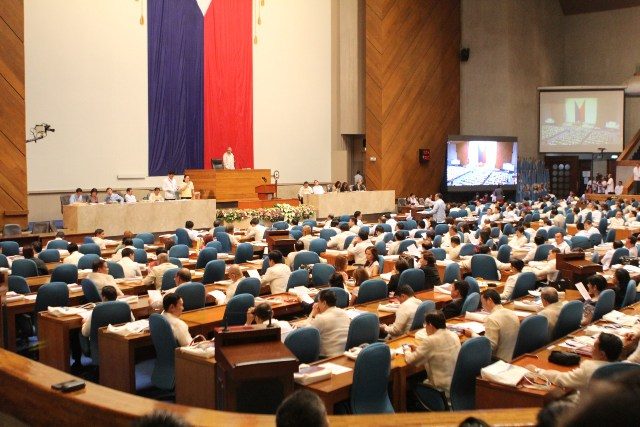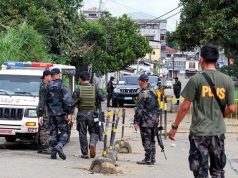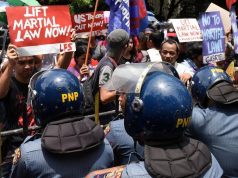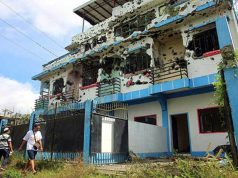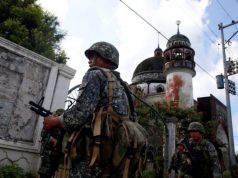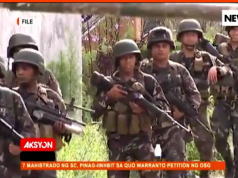MANILA, Philippines – (UPDATE, 6:41 P.M) Congress will convene in joint session to tackle the request of President Rodrigo Duterte to extend the period of martial law in Mindanao for one year, from January 1, 2018 to December 31, 2018.
Majority Leader Rodolfo Fariñas said the joint session of the House of Representatives and the Senate will be on Wednesday, December 13 at 9 a.m.
The Constitution mandates the approval of the extension by Congress.
In his five-page December 8 letter to Senate president Aquilino “Koko” Pimentel III and Speaker Pantaleon Alvarez, Duterte asked the chambers to extend martial law in Mindanao until 2018, “primarily to ensure total eradication” of terrorist groups in the region “inspired by DAESH” or ISIS such as the Da’awatul Islamiyah Waliyatul Masriq (DIWM) and other local and foreign extremist groups and armed lawless groups “and the communist terrorists and their coddlers, supporters, and financiers.”
The President said his request for Congress to extend martial law in the South was based on the “security assessment made by” the Armed Forces of the Philippines (AFP) chief as stated in the December 4, 2017 letter that Duterte received from Department of National Defense chief Delfin Lorenzana.
TERRORISTS REGROUPING: DUTERTE
He argued that that Islamist militants have been regrouping since a five-month urban conflict ended in the South in October.
He said fighters who survived the battle for Marawi City were determined to establish a Southeast Asian ‘wilayat’ – or governorate – for Islamic State and named militant Abu Turaifie as potentially the radical group’s next regional “emir”.
The previous “emir”, Isnilon Hapilon, and another rebel commander loyal to Islamic State were killed in October as the military closed in on fighters who had occupied the heart of Marawi since May 23.
More than 1,100 people – mostly militants – were killed and 350,000 displaced by the Marawi unrest.
In his letter to the Senate and House of Representatives, Duterte said militants were radicalizing and recruiting local people, reorganizing themselves and building their finances.
“These activities are geared towards the conduct of intensified atrocities and armed public uprisings,” he said, adding that they were aimed at establishing a global Islamic caliphate and a ‘wilayat’, not only in the Philippines but the whole of Southeast Asia.
A group led by Turaifie – who heads a splinter group of the Bangsamoro Islamic Freedom Fighters and, according to Duterte, is “said to be Hapilon’s potential successor” – was planning bombings in the Cotabato province south of Marawi.
Intelligence reports indicate that militants are plotting to attack another city, Presidential Communications Secretary Martin Andanar said on Monday.
Duterte placed restive Mindanao, which has a population of 22 million, under military rule after the attack on Marawi, and martial law was due to be lifted there on Dec. 31.
CONGRESS NOD NEEDED, BUT EXTENSIONS UNLIMITED
Continuing martial law beyond the initial 60-day limit requires lawmakers’ approval, but the constitution does not limit any extensions.
Martial law allows for tougher surveillance and arrests without warrant, giving security forces greater rein to go after suspected extremist financiers and facilitators.
Duterte has long warned that Mindanao faced contamination by Islamic State, and experts say Muslim parts of the predominantly Catholic southern Philippines are fertile ground for expansion, due to their history of marginalization and neglect.
Critics of Duterte, who has held open the possibility of extending military rule to the whole country, have slammed the imposition of martial law in Mindanao as a misuse of power and evidence of the president’s authoritarian tendencies.
Martial law is a sensitive issue in the Philippines, bringing back memories of the 1970s rule of late dictator Ferdinand Marcos, who was accused of exaggerating security threats to justify harsh measures to suppress dissent.
Human rights group Karapatan questioned why martial law should be extended in Mindanao nearly two months after the military’s victory in Marawi City.
“This is a dangerous precedent that inches the entire country closer to a nationwide declaration of martial rule,” it said in a statement.

